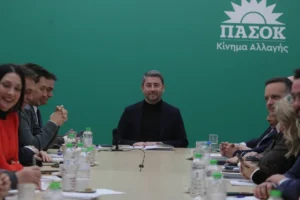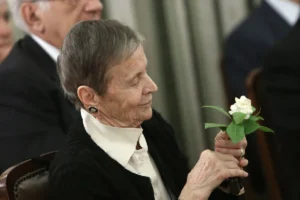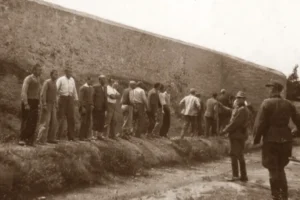The Turkish side insists on its claim that, after behind-the-scenes diplomatic negotiations among Athens, Rome, and Ankara, it granted “permission” (!) to the Italian research vessel to complete its investigations south of Kasos – Karpathos. The Greek side denies Turkey’s “scenario” of a “retreat” but avoids providing evidence to the contrary. Turkey claims they granted “permission” in the Kasos incident and according to Turkish claims, Rome requested “permission” from Turkey.
There are growing questions about the recent activities of the Italian vessel ‘Ievoli Relume,’ which was conducting surveys south of Kasos and Karpathos, within the area of Greek sovereign rights. The vessel was operating within six nautical miles of Greek territorial waters (EEZ) and just outside them, i.e., between 6 and 12 nautical miles, which Greece, under international law, has the right to extend. This area is also within the delimited zone of the Greek-Egyptian EEZ.
The Greek government asserts that no “permission” was sought from Turkey, which had dispatched five warships to prevent the Italian vessel from continuing its exploration outside the 6 nautical miles. Without providing further clarification, the Greek government assures that the vessel’s exploration was completed under the watchful presence of Greek warships and rejects Turkey’s claim of a Greek “retreat.”
Conversely, the Turkish side claims that the vessel’s surveys were completed (on this point, the Turkish position aligns with the Greek) only after Ankara granted “permission” (!), following diplomatic negotiations among Athens, Rome, and Ankara.
The Athens-Ankara-Rome ‘Triangle’
Indicative of Ankara’s stance are the “leaks” published on the pro-government TV station CNN Türk’s website, titled “Warships Facing Each Other! Behind the Scenes of High Tension in the Aegean.”
According to the website, “The Italians asked Turkey for permission to cross (at the point where Turkey now disputes Greek sovereignty). Diplomacy came into play. A dialogue was initiated under the coordination of the Turkish foreign ministry, involving diplomatic processes with Greece. The coordinates where the permit was granted were determined and completed under the control of Turkish Navy ships. (…) The area applied for and finally authorized is within the limits of the Maritime Jurisdiction Zones Agreement signed between Turkey and Libya.”
Unanswered Questions
Given that both Athens and Ankara acknowledge diplomatic understandings to defuse the tension, yet provide no convincing explanations, questions remain:
- Was the only channel of communication between Greek and Turkish foreign ministers G. Gerapetritis and H. Fidan? Did they coordinate the decisions, or was there involvement from other officials, such as Deputy Foreign Minister Alexandra Papadopoulou? Was the Prime Minister aware, and was there coordination with the Maximos Mansion?
- Was it ultimately agreed to proceed and complete the Italian vessel’s surveys in an area of Greek sovereignty – jurisdiction, despite the presence of Turkish warships?
If these questions are not convincingly answered, it is evident that both the Greek and Turkish governments cannot be telling the truth simultaneously. Someone is lying. This is especially pertinent since the Italian vessel continued its surveys without the Turkish warships leaving the area. If the Turkish warships had left, the government could indeed claim a “de-escalation.” Since this did not happen, the government’s claims lack credibility.
Growing Suspicions
An article in Kathimerini, titled ‘The 40 Hours of Alarm,’ heightens suspicions and reservations about the Greek government’s claims of a ‘successful de-escalation’ through ‘diplomatic channels.’
Turkish aggressive moves had seriously escalated since the early morning of July 22, until the afternoon of July 23, when Greek and Turkish naval forces confronted each other in the area where the Italian ship was conducting surveys as part of the Greece-Cyprus electricity interconnection project.
“On July 23,” the newspaper reports, “communication channels were activated at the diplomatic level. Foreign Minister George Gerapetritis spoke several times with his counterpart Hakan Fidan. Equally dense contacts took place at the diplomatic level between Deputy Foreign Ministers Alexandra Papadopoulou and Memet Kemal Bozai. Shortly after 10 p.m. on Tuesday evening, the two sides met again in Brussels.”
“Grey” or “Black” Zone?
Like the Turkish side, the Greek side, through Foreign Minister George Gerapetritis, insists that the issue has been “resolved” (!) through “channels of communication that have been established to defuse tensions between the two countries.” The difference is that the Turkish side claims the sea area as its own, asserting that Greece and Italy were forced to seek its “permission,” while the Greek side maintains that everything was handled diplomatically.
Nevertheless, Gerapetritis is mistaken when he says, “Neither of the two countries (Greece and Turkey) is dissenting from their respective basic positions, nor could we reasonably expect this.” This is an oxymoronic claim. If the positions of the two countries are diametrically opposed, then what happens? What kind of arrangements did Athens make with Ankara so that, under the threatening presence of Turkish warships, the Italian research vessel could enter an area of Greek sovereignty – jurisdiction, disputed by Turkey? The Foreign Minister does not specify. Thus, suspicions of another ‘grey’—if not ‘black’—zone are seriously growing.












